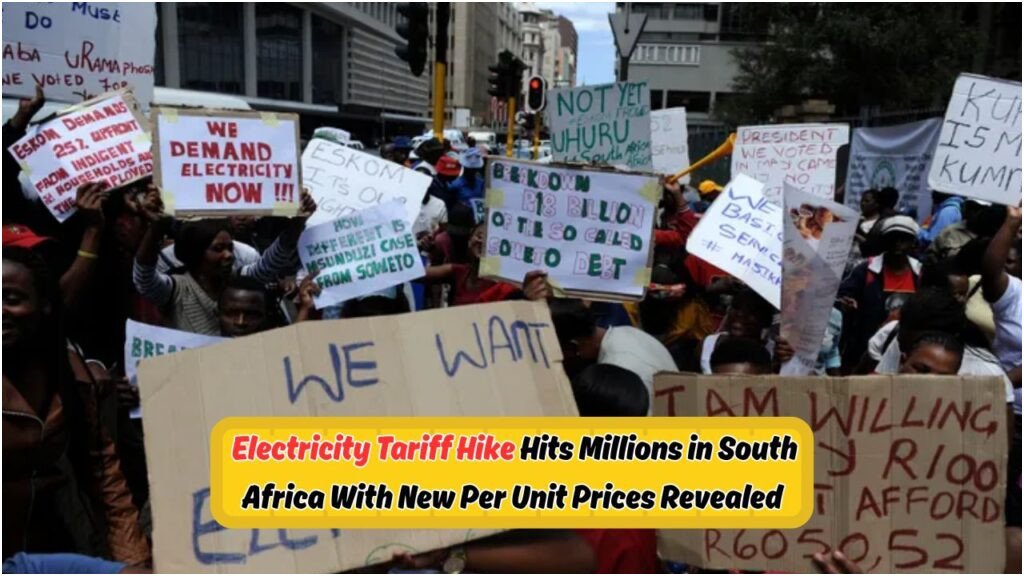Electricity Price Hike in South Africa: South Africans are gearing up for a significant change in their monthly expenses as the country faces an electricity price hike starting August 11. This increase is a result of ongoing financial pressures on the national power supplier, Eskom, leading to a tariff adjustment that will affect households and businesses alike. As energy costs rise, citizens are urged to explore energy-saving measures to mitigate the impact on their budgets. The increase is expected to have widespread implications on the cost of living, potentially affecting everything from grocery bills to manufacturing costs, as energy expenses ripple through the economy.
Understanding the South African Electricity Tariff Increase
With the new electricity price hike, it is crucial for South Africans to understand the reasons behind this adjustment. Eskom, the state-owned power utility, has been grappling with financial instability due to aging infrastructure, maintenance backlogs, and a need to transition towards cleaner energy sources. These factors have prompted the National Energy Regulator of South Africa (NERSA) to approve a tariff increase as a necessary measure to stabilize the system.
- Increased operational costs due to maintenance and upgrades
- Transition to renewable energy sources
- Inflationary pressures affecting operational budgets
- Debt servicing and financial restructuring
Impact on Households and Businesses
| Category | Current Tariff (c/kWh) | New Tariff (c/kWh) | Percentage Increase |
|---|---|---|---|
| Residential | 135 | 150 | 11% |
| Commercial | 120 | 135 | 12.5% |
| Industrial | 110 | 125 | 13.6% |
| Agricultural | 100 | 115 | 15% |
How Households Can Manage the Electricity Price Increase
As households prepare for the increase, there are several strategies that can be employed to manage electricity consumption effectively. By adopting energy-efficient practices, families can significantly reduce their electricity bills and lessen the impact of the tariff hike.
- Investing in energy-efficient appliances
- Utilizing smart home technologies to monitor and control energy usage
- Implementing solar panels for alternative energy
Businesses Adapting to New Electricity Prices
| Industry | Impact Level | Adaptation Strategy | Expected Outcome |
|---|---|---|---|
| Retail | Moderate | LED lighting, energy audits | Cost savings |
| Manufacturing | High | Upgrade machinery, energy management systems | Efficiency improvement |
| Hospitality | Moderate | Smart thermostats, solar heating | Reduced energy costs |
| Farming | High | Solar irrigation, energy-efficient equipment | Lower operational costs |
The Broader Economic Impact of the Electricity Price Hike
Beyond individual households and businesses, the electricity price increase is anticipated to have a broader economic impact across South Africa. As electricity costs rise, the production cost for goods and services will likely increase, potentially leading to higher consumer prices.
- Inflationary effects on goods and services
- Potential slowdown in economic growth
- Increased operational costs across industries
Government and Community Responses to Rising Electricity Prices
| Response | Entity | Action Taken | Expected Benefit |
|---|---|---|---|
| Policy Adjustment | Government | Subsidies for renewable energy | Reduced reliance on Eskom |
| Community Initiatives | Local NGOs | Energy-saving workshops | Increased awareness |
| Corporate Responsibility | Businesses | Investment in sustainable practices | Brand reputation |
Preparing for Future Electricity Price Changes in South Africa
Looking ahead, it is essential for South Africans to remain informed and proactive about future electricity price adjustments. By staying updated with Eskom’s announcements and exploring sustainable energy alternatives, both individuals and businesses can better navigate the challenges posed by fluctuating energy costs.
- Regularly review energy bills for accuracy
- Stay informed through reliable news sources
- Participate in community energy forums
FAQs About the Electricity Price Hike in South Africa
What is the reason for the electricity price hike?
Financial instability at Eskom and the need for infrastructure upgrades are primary reasons.
How can households cope with the increased tariffs?
Adopting energy-efficient appliances and smart home technologies can help manage costs.
Will businesses face significant challenges due to the price hike?
Yes, especially in energy-intensive industries, but strategic adaptations can mitigate impacts.
Are there any governmental aids available?
The government is exploring subsidies for renewable energy initiatives.





